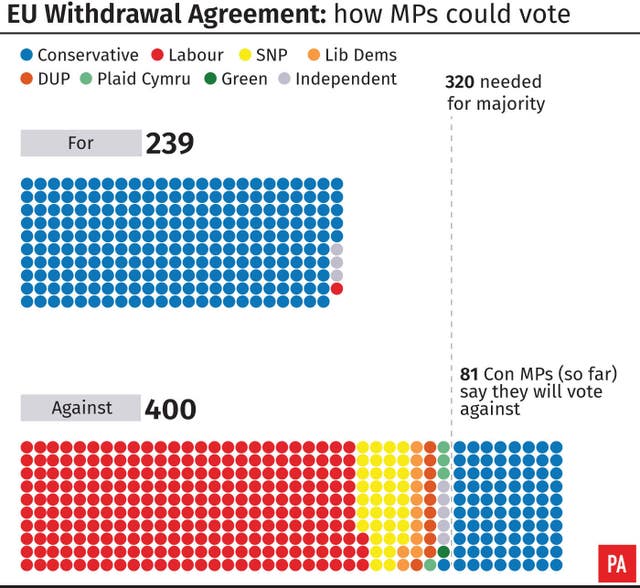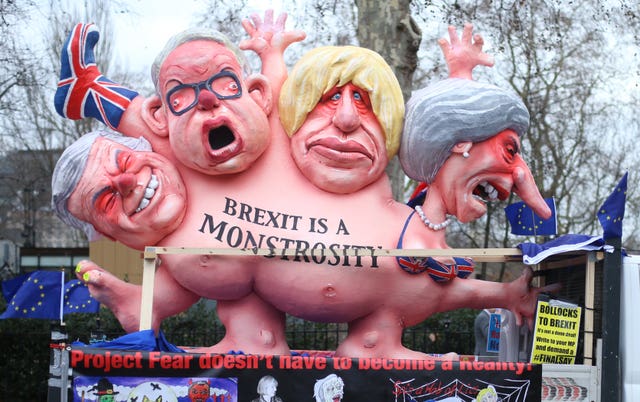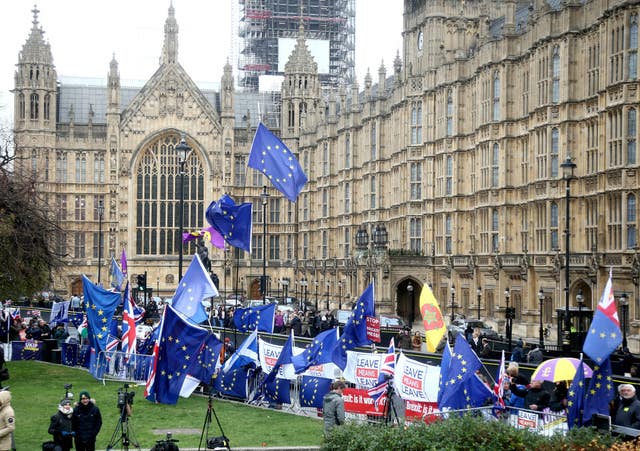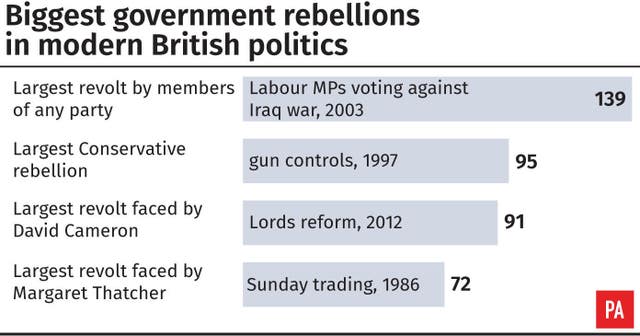Theresa May heading for historic defeat in Brexit vote
A defiant Prime Minister told Cabinet she ‘passionately’ believes the Government must take Britain out of the European Union.

Theresa May has told senior ministers she believes “passionately” that they must take Britain out of the European Union, ahead of what is expected to be a devastating parliamentary rejection of her Brexit plans.
The Withdrawal Agreement secured by the Prime Minister in Brussels in November looks set to go down to one of the heaviest Commons defeats in modern history, after a last-gasp appeal to Tory rebels fell on deaf ears.
But Mrs May made clear she would not back away from Brexit in response, telling the Cabinet the Government is “the servant of the people” and must deliver on the result of the 2016 referendum in which voters opted to Leave by 52%-48%.
She told colleagues at the weekly meeting in 10 Downing Street that she will respond “quickly” if her deal is rejected by MPs.
Opening the final day of debate in the Commons, Attorney General Geoffrey Cox said that in the event of a Government defeat the agreement would have to return “in much the same form with much the same content”.
Jeremy Corbyn has told Labour MPs he will table a motion of no confidence in the Government “soon” after a defeat, in the hope of triggering a general election.
Mrs May will make her final appeal to MPs in a statement closing five days of debate ahead of a series of votes, culminating with MPs’ final judgment on her plan at around 8.30pm.
Speaker John Bercow has allowed debate on an amendment tabled by Mr Corbyn to ditch Mrs May’s plan and “pursue every option” to prevent the UK leaving the EU with no deal.

Also selected for debate were an SNP amendment to reject the Brexit deal and proposals by Tory backbenchers Sir Edward Leigh and John Baron for the UK to take unilateral powers to end controversial “backstop” arrangements.
Labour’s Hilary Benn pulled an amendment which would have blocked both the PM’s deal and a no-deal outcome, saying it was vital to get “the clearest expression of view” from MPs on the Government’s proposals.
Assurances over the backstop received from the EU on Monday appear to have failed to win over significant numbers of the deal’s critics among the Tories and their DUP allies.
Confirming that the 10 DUP MPs will not back the PM’s deal, party leader Arlene Foster told a press conference in London: “We said to the Prime Minister she had to get rid of the backstop and get a Withdrawal Agreement that can be lived with. I don’t think she even asked to get rid of the backstop.”
In a statement, the DUP said its support was conditional on “legally binding changes” to the Withdrawal Agreement to deliver an end date for the backstop arrangements, designed to avoid a hard border in Ireland.
It is thought that Mrs May’s response to a defeat will take the form of an oral statement to the Commons immediately after the division.
Reports suggested a call from Work and Pensions Secretary Amber Rudd at Cabinet for an immediate indicative vote to rule out a no-deal Brexit in the event of defeat met strong resistance from other ministers.
As campaigners from both Remain and Leave camps staged demonstrations outside Parliament, Mrs May was meeting MPs in her Commons office in a last-ditch bid to persuade them to back her deal.
She is understood to be focusing her efforts on Tory backbenchers, rather than trying to reach out for support from other parties.

German foreign minister Heiko Maas said Brexit talks would continue if Mrs May’s deal was rejected by MPs, but there was unlikely to be “substantial” change to the agreement.
Mr Maas said: “If there were still a solution that could be presented under even greater pressure, I would ask myself why it has not been put on the table before in order to ensure that this evening’s vote takes place under better circumstances.
“That is why I believe that the agreement is as it stands and will not be substantially changed, but that, if things go wrong tonight, there will certainly be talks again.”
A no-confidence vote could come as early as Wednesday if Mr Corbyn tables a motion as a point of order in the immediate aftermath of the “meaningful vote”.
But it appears unlikely that Labour can muster enough votes to force a general election, with Tory rebels and the DUP indicating they would continue to back the Government in a confidence vote.
The Prime Minister has insisted she is focused on winning the vote, telling Conservative rebels on Monday evening that they risked handing the keys of No 10 to Mr Corbyn.
However the Daily Telegraph quoted one Cabinet source as saying it would be “hard for her to carry on” if she lost by more than 100 votes.
The deal suffered its first official parliamentary defeat in the House of Lords on Monday night as peers voted by 321 votes to 152 – a majority of 169 – to reject it.
Downing Street has given little indication on how the Prime Minister intends to proceed if she is defeated.
Under the terms of an amendment passed last week, she must table a motion on her Plan B by Monday.
Some reports have suggested she could fly to Brussels – possibly as early as Wednesday – in an attempt to obtain further concessions on the backstop.

But that could prove problematic if she has suffered a massive defeat, with EU leaders reluctant to give ground if they believe it is impossible for her to get the deal through the Commons.
Alternatively, she could opt to bring the deal back to the House for a second – or possibly even a third – time in an attempt to wear down the opposition.
Dominic Raab said Brexiteers like him could back a deal if aspects such as the backstop were dealt with.

The former Brexit secretary told BBC Radio 4’s Today programme: “I made clear when I resigned that there were three aspects that needed to be addressed.
“The backstop is clearly one of them and I want to see very clearly the Withdrawal Agreement linked to a best-in-class free trade agreement.
“If we could do those two things, someone like me would say that, actually, we could vote for it.”





